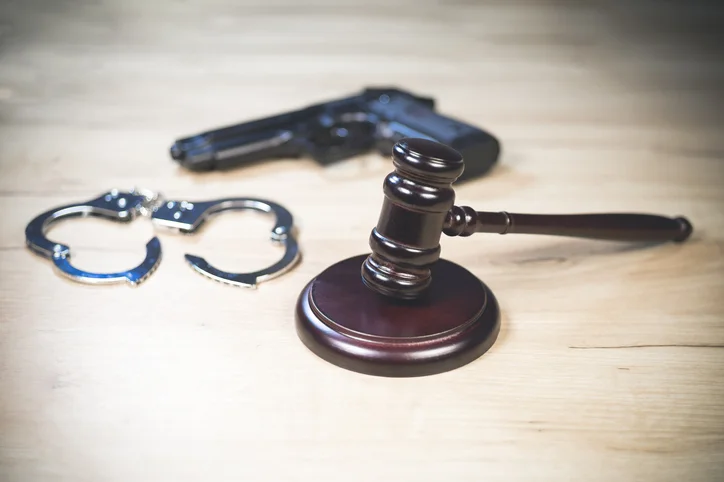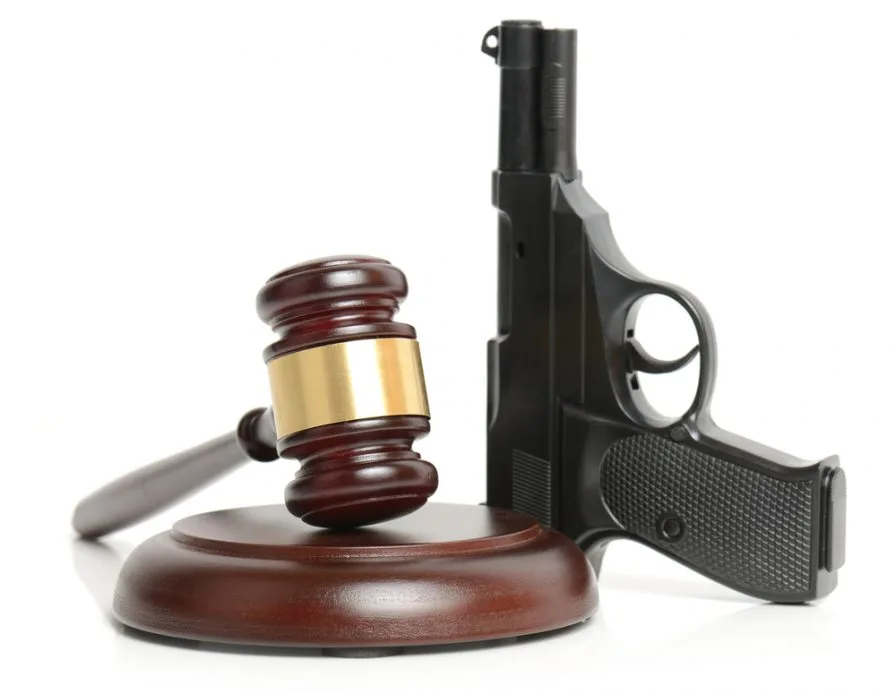Gun charges in Massachusetts don’t always involve weapons found in your hands or even on your person. In fact, you can face serious legal consequences for a firearm discovered in a nearby bag, a glove compartment, or under a car seat, even if it wasn’t technically yours.
Let’s walk through what the law says about constructive possession, how prosecutors in Worcester and surrounding towns build these cases, and what you can do if you’re facing gun charges without having a weapon directly on you.
What Is Constructive Possession Under Massachusetts Law?
Constructive possession is the concept that even if you aren’t holding a weapon at the time, you have both the ability and intention to control a firearm.
How Does Constructive Possession Differ From Actual Possession?
Constructive possession means you had the power and intention to control a firearm, even if it wasn’t physically on your body. Actual possession means the firearm was in your hand, waistband, pocket, or otherwise directly under your control.
Massachusetts courts use constructive possession to hold people accountable when a weapon is found in a location they control, like their car or a shared apartment, even if they never touched it. If the prosecution can show you knew the firearm was there and had the ability to control it, they may pursue charges under M.G.L. c. 269 §10(a) or §10(h).
This principle is often used when a gun is found under a seat or hidden in a backpack, especially during a routine traffic stop or search.
What Factors Establish Constructive Possession?
Courts will consider several key factors to determine whether constructive possession applies:
- Proximity: Was the firearm near you or within easy reach?
- Control: Did you own or control the space where the firearm was found?
- Knowledge: Did you know the firearm was there?
- Behavior: Did you act in a way that suggested ownership or control?
- Statements: Did you say anything indicating the gun was yours or that you knew it was there?
No single factor is enough. But taken together, these clues can lead to a criminal charge, even if the firearm wasn’t on your person.

How Do Massachusetts Courts Determine Constructive Possession?
It comes down to a deep consideration of the evidence against you, as well as notable case precedents.
What Evidence Is Considered?
Prosecutors in Worcester and across Massachusetts rely on a mix of physical evidence and circumstantial proof when building constructive possession cases.
This may include:
- Fingerprints or DNA on the firearm
- Statements made during questioning
- Surveillance footage or dash cam video
- Location of the weapon relative to the defendant
- Who had access to the area where the weapon was found
If you’re in a car and a gun is discovered under your seat, prosecutors may argue that you exercised control over the weapon, even if you never touched it.
Are There Notable Case Precedents?
Yes. In Commonwealth v. Romero, the Massachusetts Appeals Court upheld a constructive possession conviction based on proximity, shared control over the area, and the defendant’s behavior during the search.
This and other cases confirm that actual possession isn’t required. It’s about whether you had both knowledge and control.
What Are the Legal Consequences of Constructive Possession Charges?
Constructive possession charges could lead to penalties like significant jail time and fines under Maryland law.
What Penalties Apply Under M.G.L. c. 269 §10(a) and §10(h)?
What penalties apply under M.G.L. c. 269 §10(a) and §10(h)?
- Under M.G.L. c. 269 §10(a), carrying a firearm without a License to Carry (LTC) outside your home or business carries a mandatory minimum sentence of 18 months in jail. That’s a felony with no parole, probation, or sentence reduction allowed during that period.
- Under §10(h), possessing a firearm inside your home or place of business without a valid license is still a crime, punishable by up to 2 years in jail or a fine of up to $500.
Both charges are serious, and prosecutors treat them aggressively, especially in cities like Worcester.
How Does the Bartley-Fox Law Influence Sentencing?
The Bartley-Fox Law, enacted in 1975, imposes a mandatory one-year jail sentence for anyone convicted of carrying a firearm without a license in a public place.
This law was designed to deter illegal gun possession and eliminate the possibility of a suspended sentence or probation. It applies regardless of prior criminal history.
So even if you’ve never been in trouble before, being caught with a gun you don’t have a license for (whether in your hand or your trunk) can mean jail time.

What Defense Strategies Can Challenge Constructive Possession Allegations?
An experienced attorney can argue several things to help in your defense, including a lack of knowledge and control over the area.
Can Lack of Knowledge Be a Defense?
Yes. If you didn’t know the firearm was present, you may be able to argue that you lacked the intent and awareness required for constructive possession.
For example, if someone left a weapon in your car without your knowledge, your lawyer can challenge the prosecution’s assumption that you had control or knowledge of the weapon’s presence.
Lack of knowledge directly undermines the theory of constructive possession.
How Can Control Over the Area Be Contested?
Constructive possession often hinges on whether the area where the weapon was found was under your exclusive control.
If multiple people had access, such as in a shared car, home, or apartment, that weakens the prosecution’s case. Your attorney may argue that someone else had equal or greater control over the location of the firearm.
This is especially useful when a weapon is found in a shared glove box, trunk, or center console.
What Role Does Unlawful Search and Seizure Play?
If the police obtained the firearm through an illegal search, your attorney may file a motion to suppress.
Evidence obtained without probable cause or a valid search warrant may be excluded from court. If the gun was found during an unconstitutional search, the entire case could collapse.
Fourth Amendment violations are one of the strongest tools in challenging firearm charges.

How Should You Respond If Accused of Constructive Possession?
If you’ve been accused of constructive possession, it’s important to know the right steps to take.
Immediate Steps To Take
The most important step is to remain silent and contact a criminal defense attorney immediately.
Don’t explain yourself to the police. Don’t try to clarify ownership. Don’t talk your way out. Everything you say can be used against you, especially in a constructive possession case, where the evidence is already circumstantial.
Importance of Legal Representation
An experienced defense attorney can:
- Challenge the prosecution’s interpretation of “control”
- File motions to suppress illegally obtained evidence
- Highlight weaknesses in fingerprint, DNA, or testimonial evidence
- Present alternative theories of possession
In Worcester and surrounding towns, these cases are prosecuted with intensity. You need someone who knows how to fight back, early and effectively.
How Can Attorney Darren Griffis Assist in Constructive Possession Cases?
Attorney Griffis offers deep experience and expertise in handling constructive possession cases.
What Expertise Does Attorney Griffis Offer?
Attorney Darren Griffis focuses on criminal defense in Worcester County, with specific experience in firearm-related offenses.
He understands the nuances of constructive possession, how prosecutors build these cases, and where those arguments tend to fall apart.
How Does Local Knowledge Benefit Your Case?
Knowing the judges, prosecutors, and court staff at Worcester District Court gives Attorney Griffis insight into how these cases are likely to be handled.
He’ll anticipate the prosecution’s strategy, file timely motions, and tailor your defense based on what actually works in Worcester’s criminal courts.
FAQ
Can I be charged if the firearm was in a shared space?
Yes. If you had access to the space and knew the weapon was there, prosecutors can argue constructive possession.
What if I had no idea the firearm was present?
That may be a valid defense. Lack of knowledge undermines the key elements of constructive possession.
Does owning the property where the firearm was found affect my case?
Not necessarily. Ownership alone isn’t enough. Control and knowledge are what matter most.
How does Massachusetts law define “control” over a firearm?
Control means the ability to exercise dominion over the firearm, either physically or through ownership of the space it was found in.
Are there differences in penalties between actual and constructive possession?
No. Both forms of possession carry the same mandatory minimum sentences if unlicensed. Constructive possession is just a different legal pathway to the same charge.
If you’re facing a constructive possession charge in Worcester, Shrewsbury, Millbury, or nearby towns, don’t wait to seek legal help. These are complex cases with serious consequences and the sooner you build a defense, the better your chances.me.
